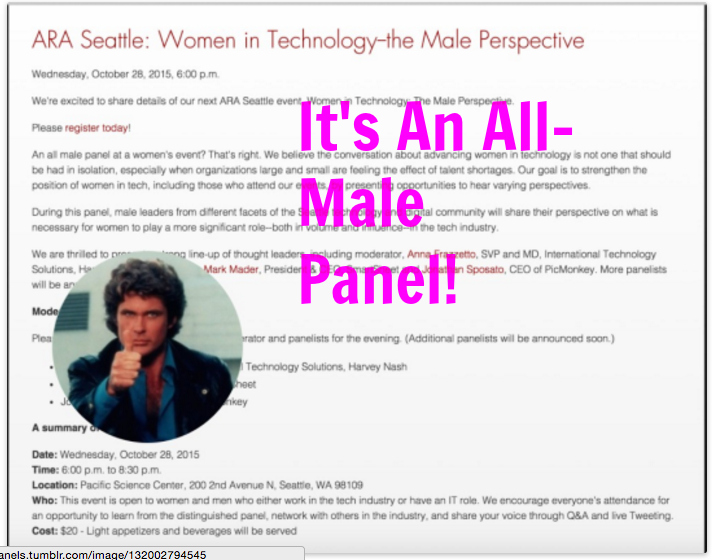Most women are generally not surprised when they attend a community event designed to spotlight male voices and accomplishments. In fact, it’s such a default in the worlds of advocacy and public service that many attendees don’t even notice it.
It’s a sad fact that we have to continue to struggle for simple inclusion and that the idea is radical enough to draw so much attention. The Tumblr Congrats, You’ve Got An All Male Panel! has received international press coverage from highbrow media outlets like the BBC and The Atlantic.
Locally, Seattle blog C Is For Crank published an assessment of the issue after an all-male panel hosted by The Seattle Times . Seattlish and The Seattle Met, amongst others, picked up the story. Now we have a great local dialogue and a Moveon.org petition with almost 600 signatures to end the practice. It’s wonderful that we’re having these conversations, and acknowledging that excluding women and people of color is wrong.
But it’s not simply a moral failing. When everyone in the room has a similar identity and background, outcomes are worse. There are too many studies that confirm this to list; a simple Google search of “diversity benefits” will yield pages of results from universities, consulting firms, and HR publications.
In communications, we know this all too well. A room of all-white men will produce a message from that perspective. That's a message that will likely not appeal to the rest of the world. We see this over and over again on a myriad of serious topics, from environmentalism to economic justice. But nothing beats the trivial starkness of vintage tampon ads to illustrate this point. No one using menstrual products was designing those ads. And it shows. Then take a look at modern ads like Always #LikeAGirl campaign, which ran during the Super Bowl, and was designed and produced by teams that included women.
The contrast is clear. And there’s no reason to believe that the distinction doesn’t apply to all topics: from tampon ads to complex policy solutions. When we decide it’s too much work to include people outside the Seattle nonprofit bubble, we’re sabotaging the quality of public discourse and public life.
This isn’t an issue of women needing invitations to serve on panels. This is a case of panels needing women and people of color. The reality is that media outlets, political offices, and Seattle in general all need the perspectives and knowledge of women and people of color. So we need to do better.

